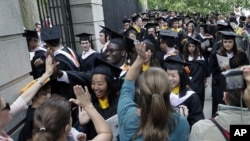The founder of the popular website Campustours.com has some good advice for foreign students trying to decide the best American college for them. His advice could help score travel money for a real-life campus tour.
“Your first stop should be calling up the schools,” Chris Carson said. “They’re very helpful.”
Carson is one of the founders of the site that just celebrated 15 years in business, hosting virtual tours and other information for over 1,200 U.S. colleges and universities.
Carson said he would never rely solely on a virtual tour in making a decision, and that calling a school could result in an economical, real-life tour.
“In some cases, if the student is a good enough student or a special case, they [the school] will sometimes pay for travel,” he said. “That’s a little-known fact.”
Calling, in fact, might even help get you in, Carson said.
“They often use something called ‘demonstrated interest’ as a factor in your admission,” he said. “It involves the number of times you contact the institution. It’s a good idea to make yourself known and ask questions. They write this stuff in your file, believe it or not. If you’ve engaged them in a conversation, they’re actually more likely to offer you admission.”
Carson said his site receives 120,000 visits from prospective foreign students per year, which is 15 percent of traffic overall.
The rising interest among international students is spurring new products.
He said in the coming months, the site will have virtual tours available in other languages and given by foreign students who likely can address questions and offer advice relevant to international students who want to study in the U.S., which is an ever-increasing number.
The Institute of International Education says that in 2011 there were more than 723,000 international students studying at U.S. colleges and universities One out of five of those students are from China, far more than any other country.
“Your first stop should be calling up the schools,” Chris Carson said. “They’re very helpful.”
Carson is one of the founders of the site that just celebrated 15 years in business, hosting virtual tours and other information for over 1,200 U.S. colleges and universities.
Carson said he would never rely solely on a virtual tour in making a decision, and that calling a school could result in an economical, real-life tour.
“In some cases, if the student is a good enough student or a special case, they [the school] will sometimes pay for travel,” he said. “That’s a little-known fact.”
Calling, in fact, might even help get you in, Carson said.
“They often use something called ‘demonstrated interest’ as a factor in your admission,” he said. “It involves the number of times you contact the institution. It’s a good idea to make yourself known and ask questions. They write this stuff in your file, believe it or not. If you’ve engaged them in a conversation, they’re actually more likely to offer you admission.”
Carson said his site receives 120,000 visits from prospective foreign students per year, which is 15 percent of traffic overall.
The rising interest among international students is spurring new products.
He said in the coming months, the site will have virtual tours available in other languages and given by foreign students who likely can address questions and offer advice relevant to international students who want to study in the U.S., which is an ever-increasing number.
The Institute of International Education says that in 2011 there were more than 723,000 international students studying at U.S. colleges and universities One out of five of those students are from China, far more than any other country.




